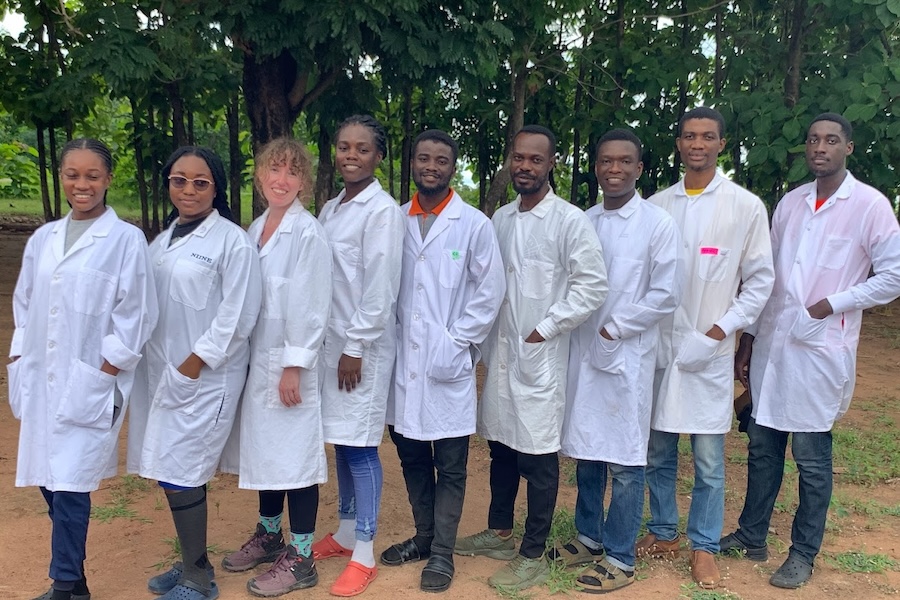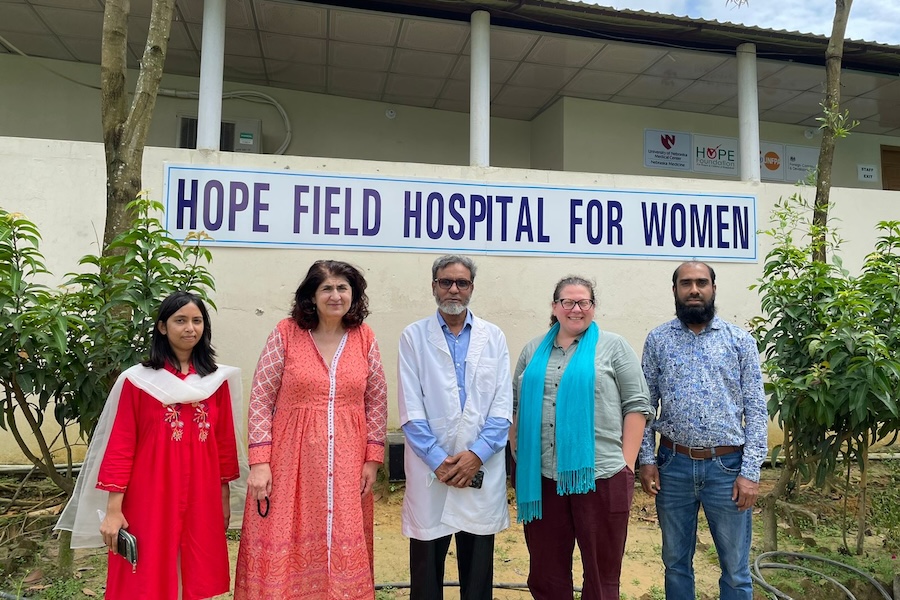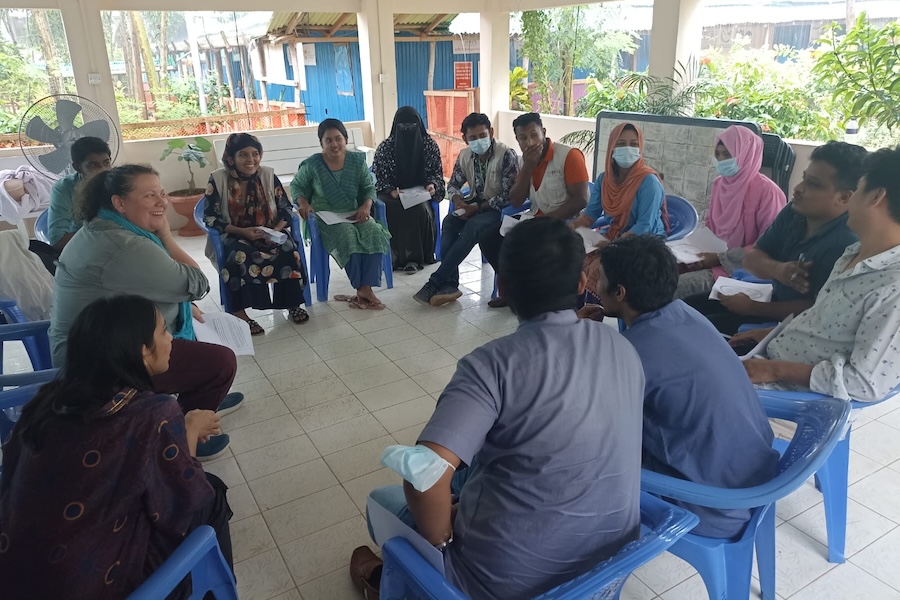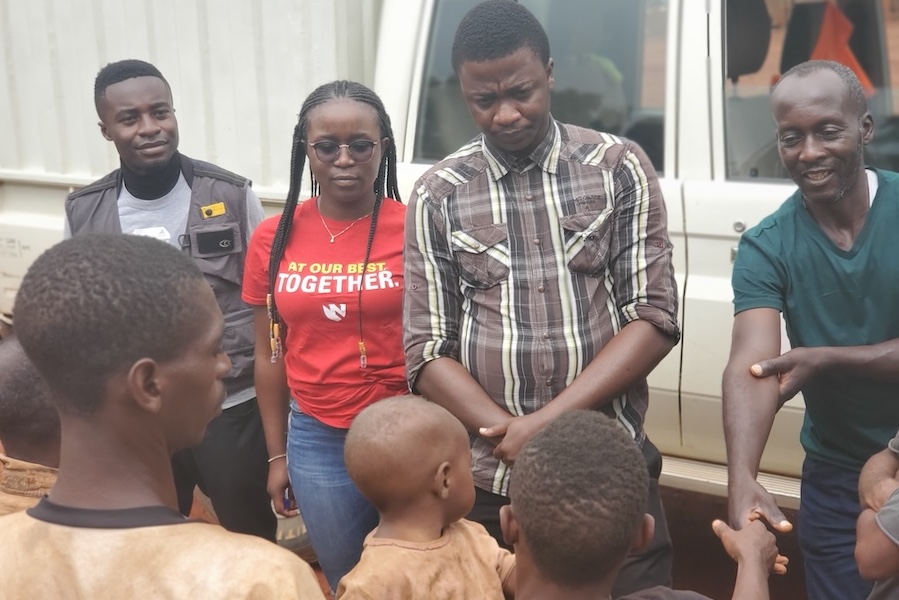Student Funding Opportunities
The College of Public Health and the Center for Global Health and Development are proud to offer two funding opportunities to public health students. Below, you can read about the Suzanne and Ward Chambers Global Health Fellowship (which includes funds for research and travel at a global site).
If you are interested in more global opportunities, please contact Danielle Thies, global health project associate or Brenda Nickol, director of career services.
Suzanne and Ward Chambers Global Health Fellowship
Read the 2025 full application details (PDF).
Please email Dr. Wael ElRayes with any questions.
The UNMC College of Public Health Suzanne and Ward Chambers Summer Global Health Fellowship Award was established in 2014 with the generous support of public health faculty member and physician Dr. Ward Chambers and his wife Suzanne Chambers. Dr. Chambers was a long-serving director for global health at UNMC, and this fellowship is dedicated to continuing his passion to introduce students to global health experiences and opportunities to support global public health advances.
The core concepts of the Suzanne and Ward Chambers Fellowship award are to expose public health students to new cultures and international public health systems, build transnational understanding, and strengthen the relationships and collaborations between students and professionals in the United States and other countries. Fellows have conducted projects in countries including Bangladesh, Cameroon, Chile, China, Ethiopia, India, Indonesia, Oman, Syria, Tanzania and Taiwan.
Every year, the College of Public Health awards up to five fellowships to public health students who want to conduct health engagement projects or population health research in qualified countries. The fellowship includes 4-6 weeks of global site work, with an additional 4-6 weeks dedicated to preparation for the research project, post-data collection analysis, and manuscript preparation. This experience provides an opportunity to co-create research capacity internationally with diverse population health partners in-country and across the Nebraska University system.
A maximum of $4,000 is given to awardees to cover all fellowship-related expenses, including personal travel, room, board, insurance, and various project-related expenses. An additional $500 is given to the awardee after presenting the work. Another $500 is awarded after publishing the fellowship project manuscript (preferably in a peer-reviewed journal). The fellowship is one of the largest awards in the College of Public Health, with total annual grants of about $25,000.
Bibiana (Marcela) Carvajal Suarez with UNMC mentor Athena Ramos: An Exploratory Study of Health and Well-Being Among Livestock Workers in the Friuli-Venezia Giulia region of Italy
Josiane Kabayundo with UNMC mentor Shinobu Watanabe-Galloway: Community-Level Assessment of Breast Cancer Stigma in Rwanda – A Mixed Method Study
Uzo Chukwuma with UNMC mentor David Brett-Major: An Integrative Approach to Strengthen Antimicrobial Resistance Surveillance Capacity in a Resource-Constrained Setting
2023
- Kathleen Angell | MPH, Epidemiology | Cambodia
- Mamello Makhele | MPH, Maternal and Child Health | Bangladesh
- Taylor Clarkson | MPH, Epidemiology | Ghana
- Natalia Santos | PhD, Health Promotion | Brazil
2022
- Julie Lubisi | PhD, Health Promotion & Disease Prevention Research | Bangladesh
- Vickie Doss | MPH, Epidemiology | Bangladesh
- Nancy Tahmo | MPH, Epidemiology | Fulbright student | Cameroon
- See presentations by 2022 awardees
2019
- Anlan Cheney | MPH, Epidemiology | India
- Sabrina Chengane | MPH, Maternal and Child Health | Fulbright student | Ethiopia
2018
- Rima AlBalushi | MPH, Epidemiology | Oman
- Christopher Tougeron | MPH, Environmental and Occupational Health | China
- Zijian Qin | PhD, Environmental Health, Occupational Health and Toxicology | China
Watch a presentation viceo on the program and application process.
Testimonials
Taylor Clarkson
From Taylor Clarkson, MPH student, "The Chambers Global Health Fellowship allowed me the unique opportunity to experience hands-on global health research and epidemiological fieldwork. My time in Ghana was absolutely incredible, I learned so much, had so much fun, and was able to explore what conducting global infectious disease research was like. I’m truly grateful for the opportunity to explore my passion, and the experience allowed me to confirm that global health research is where I’d like my future career to take me".
Vickie Doss
Vickie Doss was able to travel to Bangladesh in the summer of 2022 as part of the Suzanne and Ward Chambers Summer Global Health Student Fellowship. There Vickie worked at the largest refugee camp in the world, where she looked at prenatal care and antenatal visits during pregnancy.
"I worked at the Hope Foundation for Women and Children of Bangladesh in Cox's Bazar. The refugee camp is the world's largest refugee camp, with over 900,000. I focused on a prospective cohort research study, "Predicting Apgar Score Outcomes with Midwife Prenatal Care Among Infants Born to Rohingya Refugees in Cox's Bazar."
I also did interventions of antenatal nutrition, and education of the midwives, along with compliance education and deep dive interviews of the Rohingya women, community leaders, senior managers, and physicians of the Field Hospital's Antenatal Care Clinic to increase the number of antenatal visits during pregnancy.
Working with the Rohingya refugees in Cox's Bazar, Bangladesh, at the HOPE Foundation for Women in Children, for the Suzanne and Ward Chambers Global Health Fellowship was an academic, professional, and personal life experience that has enhanced my feeling of accomplishment in helping a marginalized community."
Julie Lubisi
Julie Lubisi, a 2nd year PhD student, was able to travel to Bangladesh in the summer of 2022 as part of the Suanne and Ward Chambers Summer Global Health Student Fellowship. Julie worked with the Hope Foundation to assess its gender-based violence screening and referral process.
“Through the generous support of the Chamber’s Fellowship, I was able to travel to Cox’s Bazar, Bangladesh to conduct a participatory evaluation study in collaboration with the Hope Foundation for Women and Children of Bangladesh which provides 24/7 care for the Rohingya living in the largest refugee camp in the world.
Along with the Hope team, I conducted semi-structured interviews and focus groups to assess the implementation of the gender-based violence screening and referral process. GBV is a critical global health issue, and Hope is committed to addressing it among the Rohingya.
Additionally, I had the opportunity to visit with community leaders from the Rohingya community, enjoy Bangladeshi hospitality and delicious cuisine, and relax on the Kolatoli Beach with a cup of tea.”
Nancy Tahmo
Nancy Tahmo, a 2nd year MPH student in the Epidemiology Department, traveled to Cameroon in the summer of 2022 as part of the Suzanne and Ward Chambers Summer Global Health Fellowship. With the Emerging Threats Epidemiology Group, Nancy collaborated with the Center for Research in Infectious Diseases to convene stakeholders in the five rainforest regions, including tribal chiefs, social mobilizers, local health districts, national research centers, and the National Zoonoses Program and One Health Cameroon.
"Spending a month on the road visiting these different and unique communities was very humbling. I worked with a diverse team, including an epidemiologist, social scientists, interpreters, community mobilizers, and entomologists. We explored, through a semi-structured qualitative approach, the cultural/economic/social contexts of the communities, probed on risky health practices, symptoms they experienced, health-seeking behaviors, and the perceived influence of the changing demographics (influx of refugees, internally displaced persons, foresters, and miners) on their health landscape. We also mapped out and met with key stakeholders across the nation, including policymakers, sentinel/active surveillance coordinators and implementers, emergency preparedness/response actors, and national zoonoses databases."
This qualitative work allowed her team to contextual preliminary findings from a systematic review they have completed of emerging and re-emerging zoonotic diseases in Cameroon. Their work is especially relevant as it combines published data in research articles, reported data in national databases, and actual community experience with zoonotic diseases. The project will help strengthen these communities' health systems through fostering interactions, research capacity, promoting health behavior initiatives, and national/international partnerships to address the challenge of zoonotic diseases.

Taylor Clarkson in Ghana, 2023

Vicki Doss and Julie Lubisi in Bangladesh, 2022

Julie Lubisi in Bangladesh, 2022

Nancy Tahmo in Cameroon, 2022